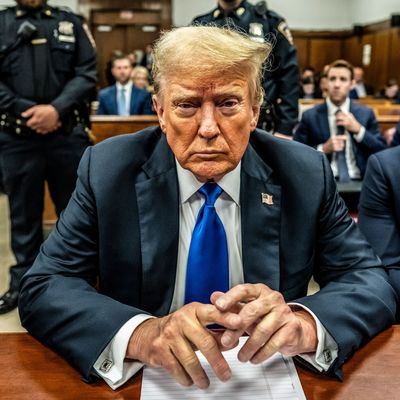
The first time I ever took a jury verdict, I almost passed out. I was a brand-new prosecutor, 29 years old, and had just given my first closing argument a few days earlier. Since then, the trial team and I had been whiling away our time, interrupted only by the occasional note from the jury seeking testimony or legal instructions as they deliberated. All of a sudden, we got word from the court clerk: Come on up, we have a verdict.
Let me tell you, there’s little in life that causes a burst of uncut adrenaline quite like the arrival of a verdict. I managed (barely) to hold it together as we performed the arcane, dramatic ritual that concludes every criminal trial. The judge brings the lawyers and the defendant back into the courtroom, the security officers take their places, the jury files in solemnly, and the judge asks: Ladies and gentlemen, have you reached a verdict? (Ummm, yes, Your Honor, that’s why we’re all back out here.) As I stood at the prosecution table while the jury took their places back in the box, I felt dizzy and had to use my arms to brace myself.
Moments before the jury read the verdict, my supervisor — a grizzled trial buzzsaw known for his blistering closing arguments — leaned over and whispered to me: “Whatever they say, no reaction. Don’t move a muscle.” I don’t know what I would’ve done if not for that last-second command. Maybe I would’ve been sensible enough not to react either way, but I’m not sure. As the jury read out its findings — starting with a “not guilty” on count one, to my horror, but then moving along to a string of convictions — I didn’t budge, or breathe, or blink.
The lesson I learned that day and throughout my prosecutorial career, and have come to value even more ever since, is that the jury’s verdict is sacrosanct. If a conviction goes our way, we prosecutors don’t pump our fists and celebrate, even mildly. And when a verdict goes against us, we don’t sulk. When we lose, we stand in and take it. Any emotional reaction, either way, would disrespect the judge, the jury, and, most importantly, the person whose liberty was about to be stripped. Prosecutors get to go to dinner and then sleep at home, no matter what the jury says. The defendant might not.
By any reasonable measure, the jury of Manhattanites who yesterday found former president Donald Trump guilty on all 34 charges did its job, and did it well.
They took on a civic duty from which many others fled; during jury selection, when Judge Juan Merchan allowed potential jurors who did not want to serve essentially to walk out the door, over half the assembled pool headed straight for the exits. The jurors sat through six weeks of testimony, they were by all accounts attentive throughout the trial, and they asked precise, insightful questions of the judge during deliberations. Nobody’s truly in position to say if the jury got it right or wrong; they saw the evidence and we didn’t — most of us, that is, including those like me who followed every line of testimony as it happened; there’s no substitute for seeing it play out live. Reasonable minds could have come out either way, and this jury found that the prosecution carried its burden of proof beyond a reasonable doubt. The jury’s work, and their verdict, deserve respect.

Third Degree With Elie Honig
Subscribe on:
But that doesn’t mean that every structural infirmity around the Manhattan district attorney’s case has evaporated. Both of these things can be true at once: The jury did its job, and this case was an ill-conceived, unjustified mess. Sure, victory is the great deodorant, but a guilty verdict doesn’t make it all pure and right. Plenty of prosecutors have won plenty of convictions in cases that shouldn’t have been brought in the first place. “But they won” is no defense to a strained, convoluted reach unless the goal is to “win,” now, by any means necessary and worry about the credibility of the case and the fallout later.
The following are all undeniable facts.
The judge donated money — a tiny amount, $35, but in plain violation of a rule prohibiting New York judges from making political donations of any kind — to a pro-Biden, anti-Trump political operation, including funds that the judge earmarked for “resisting the Republican Party and Donald Trump’s radical right-wing legacy.” Would folks have been just fine with the judge staying on the case if he had donated a couple bucks to “Re-elect Donald Trump, MAGA forever!”? Absolutely not.
District Attorney Alvin Bragg ran for office in an overwhelmingly Democratic county by touting his Trump-hunting prowess. He bizarrely (and falsely) boasted on the campaign trail, “It is a fact that I have sued Trump over 100 times.” (Disclosure: Both Bragg and Trump’s lead counsel, Todd Blanche, are friends and former colleagues of mine at the Southern District of New York.)
Most importantly, the DA’s charges against Trump push the outer boundaries of the law and due process. That’s not on the jury. That’s on the prosecutors who chose to bring the case and the judge who let it play out as it did.
The district attorney’s press office and its flaks often proclaim that falsification of business records charges are “commonplace” and, indeed, the office’s “bread and butter.” That’s true only if you draw definitional lines so broad as to render them meaningless. Of course the DA charges falsification quite frequently; virtually any fraud case involves some sort of fake documentation.
But when you impose meaningful search parameters, the truth emerges: The charges against Trump are obscure, and nearly entirely unprecedented. In fact, no state prosecutor — in New York, or Wyoming, or anywhere — has ever charged federal election laws as a direct or predicate state crime, against anyone, for anything. None. Ever. Even putting aside the specifics of election law, the Manhattan DA itself almost never brings any case in which falsification of business records is the only charge.
Standing alone, falsification charges would have been mere misdemeanors under New York law, which posed two problems for the DA. First, nobody cares about a misdemeanor, and it would be laughable to bring the first-ever charge against a former president for a trifling offense that falls within the same technical criminal classification as shoplifting a Snapple and a bag of Cheetos from a bodega. Second, the statute of limitations on a misdemeanor — two years — likely has long expired on Trump’s conduct, which dates to 2016 and 2017.
So, to inflate the charges up to the lowest-level felony (Class E, on a scale of Class A through E) — and to electroshock them back to life within the longer felony statute of limitations — the DA alleged that the falsification of business records was committed “with intent to commit another crime.” Here, according to prosecutors, the “another crime” is a New York State election-law violation, which in turn incorporates three separate “unlawful means”: federal campaign crimes, tax crimes, and falsification of still more documents. Inexcusably, the DA refused to specify what those unlawful means actually were — and the judge declined to force them to pony up — until right before closing arguments. So much for the constitutional obligation to provide notice to the defendant of the accusations against him in advance of trial. (This, folks, is what indictments are for.)
In these key respects, the charges against Trump aren’t just unusual. They’re bespoke, seemingly crafted individually for the former president and nobody else.
The Manhattan DA’s employees reportedly have called this the “Zombie Case” because of various legal infirmities, including its bizarre charging mechanism. But it’s better characterized as the Frankenstein Case, cobbled together with ill-fitting parts into an ugly, awkward, but more-or-less functioning contraption that just might ultimately turn on its creator.
Trump will appeal, as is his right, and he’s certain to contest the inventive charges constructed by the DA. I won’t go so far as to say an appeals court is likely to overturn a conviction — New York law is broad and hazy enough to (potentially) allow such machinations — but he’s going to have a decent shot at a reversal.
“No man is above the law.” It’s become cliché, but it’s an important point, and it’s worth pausing to reflect on the importance of this core principle. But it’s also meaningless pablum if we unquestioningly tolerate (or worse, celebrate) deviations from ordinary process and principle to get there. The jury’s word is indeed sacrosanct, as I learned long ago. But it can’t fix everything that preceded it. Here, prosecutors got their man, for now at least — but they also contorted the law in an unprecedented manner in their quest to snare their prey.
This article originally appeared in the free CAFE Brief newsletter. You can find more analysis of law and politics from Elie Honig, Preet Bharara, Joyce Vance, and other CAFE contributors at CAFE.com
More on Trump on trial
- Why Michael Cohen Still Misses Donald Trump
- What It Was Like to Sketch the Trump Trial
- What the Polls Are Saying After Trump’s Conviction






























